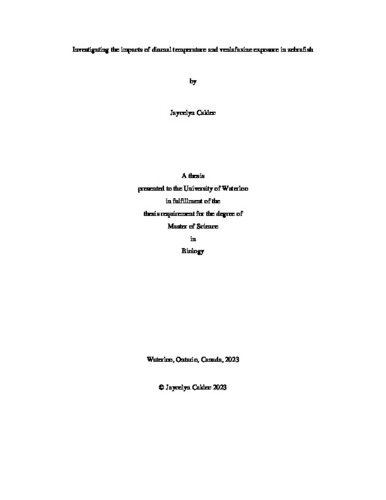| dc.description.abstract | Increased intensity and frequency of heat waves is predicted to have detrimental impacts on aquatic organisms. Thermal variability coupled with exposure to xenobiotic stress could place significant strain on the thermal acclimatory capacity and the inflammatory response of some fish species. This thesis aimed to address how known contaminants from wastewater treatment plant (WWTP) effluent coupled with diurnal temperature cycling impact laboratory zebrafish innate immune function and heat shock responses (HSR). In Chapter 2, a pilot study was completed to determine if the coupled exposure to venlafaxine (VFX) and diurnal temperature impacted the inflammatory and HSR in zebrafish (Danio rerio). Zebrafish were exposed to three respective temperature patterns: constant 27°C, constant 37°C, and continuously fluctuating between 27-37°C with or without the addition of 1 μg/L of VFX for 96-hours. Following exposure, gill samples were extracted and quantified for immune cytokine, heat shock protein, and hif1α mRNA expression using qPCR. We determined that VFX impacts pro-inflammatory cytokine expression of tnfα, il-1β, and il-8 and modulates a proinflammatory response in the gills when compared to the 27°C control. Gill mRNA increased in hsp47, hsp70 and hsp90 expression at diurnal temperatures.
In Chapter 3, we developed a robust tank design to increase experimental replicates and ran a two-week acclimation. Following the acclimation to respective experimental temperatures, we induced an acute heat stress and exposed zebrafish to VFX for 24 h to facilitate a multi-stressor environment. Here, we acclimated zebrafish to three respective temperatures: constant 25°C, constant 35°C and a fluctuating diurnal temperature between 25-35°C (12 h:12 h) for two-weeks. Following acclimation, zebrafish were exposed to an acute heat stress of 35°C and with or without 1 µg/L VFX for 24 h. We compared basal messenger RNA (mRNA) expression at 25°C to exposed zebrafish to quantify differences in several gene transcripts in the brain and gills, specifically examining innate immune cytokines, heat shock proteins, and key glycolytic and mitochondrial enzymes. No changes in cytokine expression were seen in the gills or brain. Hsp47 and hsp90 were upregulated in the gills compared to the control, but no changes were seen in hsp70 expression. In the brain, hsp70 and 90 were upregulated following acclimation to lower constant temperature (25°C), but these impacts were attenuated at elevated and diurnal temperatures, suggesting that acclimation may influence the heat shock response in the brain. Our enzymatic analysis revealed that lactate dehydrogenase (LDH) and citrate synthase (CS) were upregulated in the gills, but VFX had no impacts on LDH and CS activity. Likewise, pyruvate kinase (PK) and CS were upregulated in the brain, but VFX did not impact this response. Here we demonstrate that VFX likely does not impact the proinflammatory and enzymatic response in zebrafish. In contrast, we demonstrated that VFX may dysregulate HSP expression, especially hsp47 and hsp90, which may be detrimental to fish species living in watersheds that overlap with their upper thermal limit. Future studies should look at varying timepoints to assess the nature of the HSR to better understand the physiological changes necessary for thermal acclimation in the presence of multiple stressors. | en |

